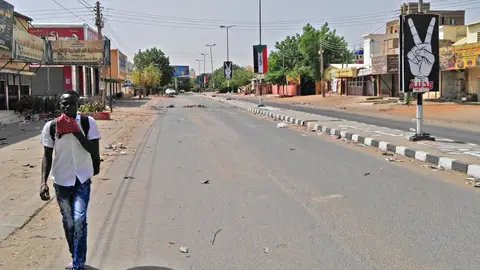What You Need to Know About The Crisis In Sudan

By Christianna Silva
On Sunday, June 9, the first day of the Sudanese work week, Khartoum was mostly deserted. And on Monday, the government insured that the Internet would be deserted, too.
After at least four people were killed at the hands of Sudanese security forces last weekend, protesters and citizens boarded up their stores in the Sudanese capital city as part of a general strike against the government, according to CNN. As the Central Committee of Sudanese Doctors, a group affiliated with the protesters, told Al Jazeera, the death toll is now at least at 118 and continuing to grow, as the uprising to gain control of the nation’s government continues on.
Since April, the dueling forces of the Transitional Military Council (TMC), which currently holds governmental power, and the pro-democracy protesters have been attempting to come to an agreement about a transition to a new government after the overthrow of President Omar al-Bashir in April. But security forces stormed a protest camp on June 3 and opened fire, threw bodies into the Nile river, burned down tents, and sexually assaulted people, according to the New York Times, dashing activists’s hopes for a peaceful transfer of power.
On Wednesday, June 5, Sudan’s government shut down mobile phone service providers and began cracking down on peaceful protests in Khartoum, according to the Washington Post. Then, less than a week later, Reuters reported that the nortorious janjaweed militia, who are culpable for commiting the genocide in Darfur, descended on the protesters.
After the pro-democracy protesters refused to go into work during the second day of their general strike on Monday, June 10, Sudan’s ruling military claimed it was the protesters who unnecessarily escalating the situation, the Associated Press reported. Later that day, according to a Thursday, June 13, report from the Post, the government methodically created a near-total Internet blackout; such a tactic is often used by dictators and autocrats when they want to regain control over their citizens and preempt political threats, according to Steven Feldstein, a researcher from Boise State University.
"The Alliance for Freedom and Change (umbrella protest movement) is fully responsible for recent unfortunate incidents ... including blocking roads which is violating international humanitarian laws," Lieutenant General Jamaleddine Omar said of the pro-democracy general strike, according to Al Jazeera. He is a member of the TMC, the paramilitary group that pro-democracy protesters have accused of violently killing hundreds of Sudanese citizens.
Civil unrest isn’t new to Sudan. President Omar Hassan al-Bashir seized power in 1989, when the country was in the midst of a 21-year civil war, according to the BBC. He ended the conflict in 2005, but then started a new one: the genocide in Darfur. (Currently, al-Bashir faces longstanding charges of genocide, war crimes, and crimes against humanity at the International Criminal Court in The Hague for his role in Darfur.)
Al-Bashir had been president of Sudan for more than three decades when anti-government demonstrations engulfed the nation’s capital of Khartoum in late 2018. Many Sudanese people could not afford to buy food, according to the New York Times, which snowballed into a movement to oust him from office. The government responded to the movement with both physical violence and online censorship by ordering telecommunications companies to periodically disable access to social media and the Internet, the Washington Post reported.
In January 2019, while the protests were raging on, a young doctor approached a group of security officials with his hands in the air. He asked if a protester who had been badly injured could be evacuated, the Times reported. A gunshot rang out and the 27-year-old doctor fell to the ground. His death became a rallying cry for protesters across the country.
On April 11, three months after the young doctor died, President al-Bashir was ousted. It wasn’t the pro-democracy protesters that ultimately forced him to step down, though — it was members of his own regime who convinced him. His own generals put him behind bars and took over the country as the TMC, promising free elections following a transitional period, according to the Associated Press.
Protests resumed, calling for the TMC to step down immediately, but they refused to transition to civilian rule. That standoff, which was relatively peaceful, lasted just two months before becoming violent in the beginning of June, the AP reported.
Young people, who make up a majority of the young country, have been leading the uprising. And they’re not giving up. Bure’e Mahjoub, an 18-year-old who was shot multiple times during the raid in a protest camp, told Reuters he’s not done fighting.
“We must get our rights,” he said.
This story has been updated with new information.





